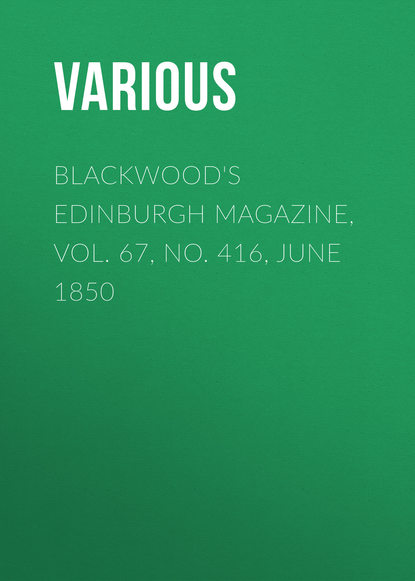По всем вопросам обращайтесь на: info@litportal.ru
(©) 2003-2024.
✖
Blackwood's Edinburgh Magazine, Vol. 67, No. 416, June 1850
Автор
Год написания книги
2017
Настройки чтения
Размер шрифта
Высота строк
Поля
2
Having described in this Chapter a dish introduced to our acquaintance by Gingham, I must here, though with an apology for discussing a matter of such importance in a note, beg leave to mention another dish, which I also partook of at Gingham's table while residing at Bordeaux in the subsequent Autumn, a period not included in the present narrative. I believe the dish is French; a boiled turbot, cold, with jelly sauce. I mention it with a degree of hesitation, because it is not exactly a dish for our climate, nor would it harmonise with the general character of an English "spread." The turbot, when boiled, should be kept in the coolest place you have got, till brought to table. So should the jelly. It is a dish for a bonâ fide warm climate, and should come to table bonâ fide cold.
The same entrée was part of a most splendid dinner given in one of the seaports of southern Europe, by some French to some British naval officers. This was at a more recent period, – my informant, the Rev. W. G. Tucker, Chaplain of the Royal Navy, who was one of the guests on the occasion, and whose approval may be safely deemed definitive, in all matters of taste. In the discharge of his professional duties, my Rev. friend is equally distinguished; and should the authorities think fit to appoint a nautical Bishop – that prime desideratum in the service – he is their man. – G. Y.
3
A Month at Constantinople. By Albert Smith. London: 1850.
4
The names of the various districts of Constantinople, sometimes rather indiscriminately used in travellers' narratives, are apt to puzzle those readers unfamiliar with the divisions of the city. The following note puts its distribution clearly before them: – "Stamboul may be termed Constantinople proper, inhabited by the Turks, and containing the Seraglio, chief mosques, great public offices, bazaars, and places of Government and general business. It is the most ancient and most important part, par excellence. Galata is the Wapping of the city: here we find dirty shops for ships' stores; merchants' counting-houses, and tipsy sailors. Tophanné is so called from the large gun-factory close at hand. Both these suburbs are situated at the base of a very steep hill; the upper part of which is Pera, the district allotted to the Franks, or foreigners, and containing the palaces of the ambassadors, the hotels, the European shops, and the most motley population under the sun. Scutari is to Stamboul as Birkenhead to Liverpool, and is in Asia. It is important in its way, as being the starting-place of all the caravans going inland. There are some other districts of less interest to the average tourist." —A Month at Constantinople, p. 46.
5
Ballantyne's Hudson's Bay.
6
Rossini's desperate idleness and habits of procrastination are proverbial. On more than one occasion personal restraint was resorted to, to compel the fulfilment of his engagements. Thus, at Milan, sentinels were placed at his door, and no exit allowed him, until he had completed an opera of which the two first acts were already in rehearsal. Barbaja, the celebrated impresario, kept him for some time prisoner in his palace on the Naples Toledo, refusing him liberty until he should have composed the long-promised opera of Otello. Remonstrances were disregarded by the inflexible manager, so Rossini set to work, and, with his usual facility, soon sent down a portion of the score, headed Introduzione. This was transmitted to the copyist; but the same evening Rossini applied for it again, on pretext of alteration. Next morning another MS. reached Barbaja, inscribed Caratina. It followed its predecessor to the copyist, and, in like manner, was re-demanded for correction. Barbaja gleefully rubbed his hands at finding that these revisions did not delay Rossini, who sent down page after page of copy, to the extent of an entire act. But the irritable manager was like to go distracted when, on applying to the copyist for the whole score, he found the introduction was all that had been composed. It had been travelling to and fro between Rossini and the theatre, and, at each journey, the incorrigible composer had headed it with a different title. The trait is characteristic, and strictly authentic. The same story is told, at greater length, and with some embellishments, in one of Alexander Dumas' volumes of Italian travelling sketches. Managers, however, found compensation in Rossini's rapidity for his provoking idleness. When he did set to work, he got over the paper at a gallop; and, when driven to the last minute, his fertility and invention were wonderful. Some of his finest things were composed on the spur of the moment, and in breathless haste. The celebrated air Di tanti Palpiti is one of these. His dinner hour was at hand, when, driven to the wall by urgent solicitations, he one day sat down to compose it. His cook, learning that the Maestro was really about to work – no very common occurrence – thrust his head in at the door, and ventured a supposition that he had "better not put the rice to boil." "On the contrary, boil it directly," replied Rossini, who was hungry. Before the rice, that indispensable preface to an Italian dinner, was fit for table, the air and its introduction were composed. Di tanti Palpiti is still familiarly known as the Aria dei rizzi.
7
Theophile Gautier, L'Ambassadrice. Biographie de la Comtesse Rossi. Paris: 1850.
8
A Memoir of the Countess de Rossi, (Madame Sontag.) London: 1850.
9
Beaumarchais, in his admirable preface to the opera of Tarare.
10
Madame Malibran, par la Comtesse Merlin. Paris: 1838.











